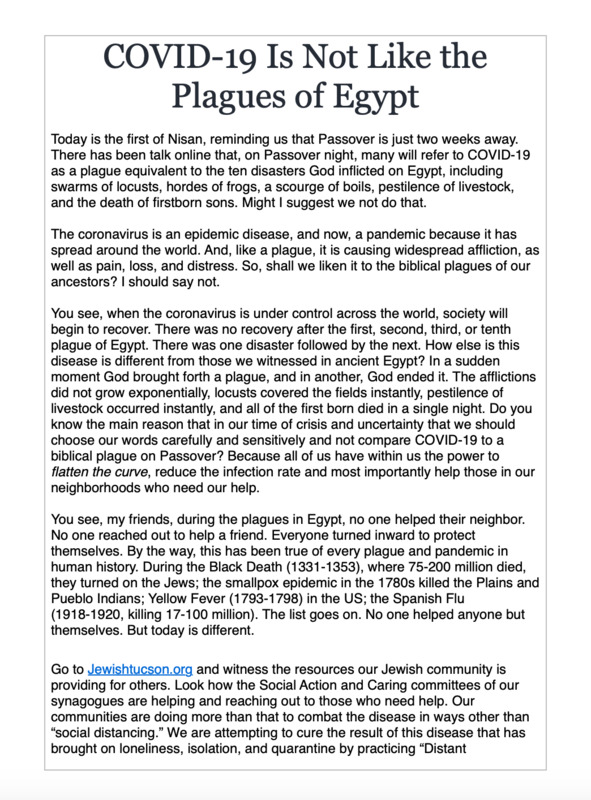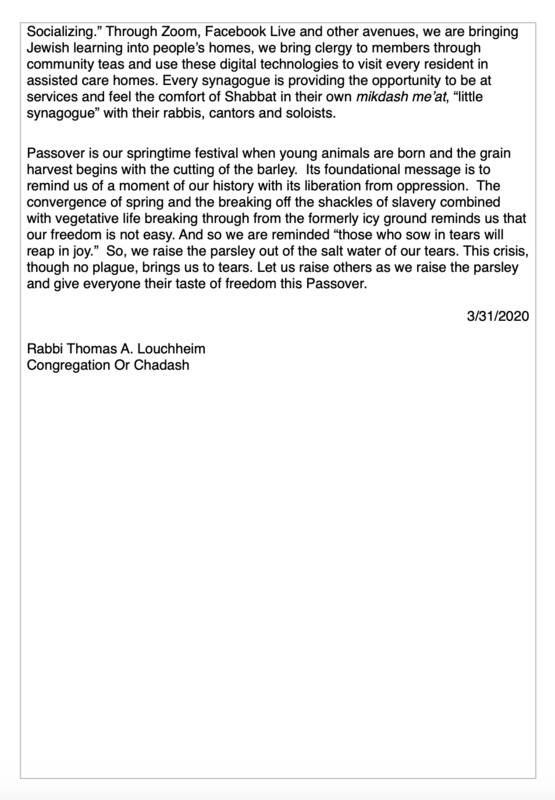Covid-19 is Not Like the Plagues of Egypt
This item originates from American Jewish Life.
- Title
- Description
- Date Created
- Community
- State
- Place
- Creator
-
Covid-19 is Not Like the Plagues of Egypt
-
This d'var Torah from Rabbi Thomas Louchheim of Congregation Or Chadash in Tucson says that our communal care for one another makes this pandemic unique.
COVID-19 Is Not Like the Plagues of Egypt
Today is the first of Nisan, reminding us that Passover is just two
weeks away. There has been talk online that, on Passover night, many
will refer to COVID-19 as a plague equivalent to the ten disasters God
inflicted on Egypt, including swarms of locusts, hordes of frogs, a
scourge of boils, pestilence of livestock, and the death of firstborn
sons. Might I suggest we not do that.
The coronavirus is an epidemic disease, and now, a pandemic because it
has spread around the world. And, like a plague, it is causing
widespread affliction, as well as pain, loss, and distress. So, shall we
liken it to the biblical plagues of our ancestors? I should say not.
You see, when the coronavirus is under control across the world, society
will begin to recover. There was no recovery after the first, second,
third, or tenth plague of Egypt. There was one disaster followed by the
next. How else is this disease is different from those we witnessed in
ancient Egypt? In a sudden moment God brought forth a plague, and in
another, God ended it. The afflictions did not grow exponentially,
locusts covered the fields instantly, pestilence of livestock occurred
instantly, and all of the first born died in a single night. Do you know
the main reason that in our time of crisis and uncertainty that we
should choose our words carefully and sensitively and not compare
COVID-19 to a biblical plague on Passover? Because all of us have within
us the power to flatten the curve, reduce the infection rate and most
importantly help those in our neighborhoods who need our help.
You see, my friends, during the plagues in Egypt, no one helped their
neighbor. No one reached out to help a friend. Everyone turned inward to
protect themselves. By the way, this has been true of every plague and
pandemic in human history. During the Black Death (1331-1353), where
75-200 million died, they turned on the Jews; the smallpox epidemic in
the 1780s killed the Plains and Pueblo Indians; Yellow Fever (1793-1798)
in the US; the Spanish Flu (1918-1920, killing 17-100 million). The list
goes on. No one helped anyone but themselves. But today is different.
Go to Jewishtucson.org and witness the resources our Jewish community is
providing for others. Look how the Social Action and Caring committees
of our synagogues are helping and reaching out to those who need help.
Our communities are doing more than that to combat the disease in ways
other than “social distancing.” We are attempting to cure the result
of this disease that has brought on loneliness, isolation, and
quarantine by practicing “Distant Socializing.” Through Zoom,
Facebook Live and other avenues, we are bringing Jewish learning into
people’s homes, we bring clergy to members through community teas and
use these digital technologies to visit every resident in assisted care
homes. Every synagogue is providing the opportunity to be at services
and feel the comfort of Shabbat in their own mikdash me’at, “little
synagogue” with their rabbis, cantors and soloists.
Passover is our springtime festival when young animals are born and the
grain harvest begins with the cutting of the barley. Its foundational
message is to remind us of a moment of our history with its liberation
from oppression. The convergence of spring and the breaking of the
shackles of slavery combined with vegetative life breaking through from
the formerly icy ground reminds us that our freedom is not easy. And so
we are reminded “those who sow in tears will reap in joy.” So, we
raise the parsley out of the salt water of our tears. This crisis,
though no plague, brings us to tears. Let us raise others as we raise
the parsley and give everyone their taste of freedom this Passover.
3/31/2020
Rabbi Thomas A. Louchheim
Congregation Or Chadash
-
March 25, 2020
-
Congregation Or Chadash
-
Arizona
-
Tuscon
-
Rabbi Thomas Louchheim
This item was submitted on July 23, 2021 by [anonymous user] using the form “Contribute Your Materials” on the site “American Jewish Life”: https://pandemicreligion.org/s/american-jewish-life
Click here to view the collected data.

